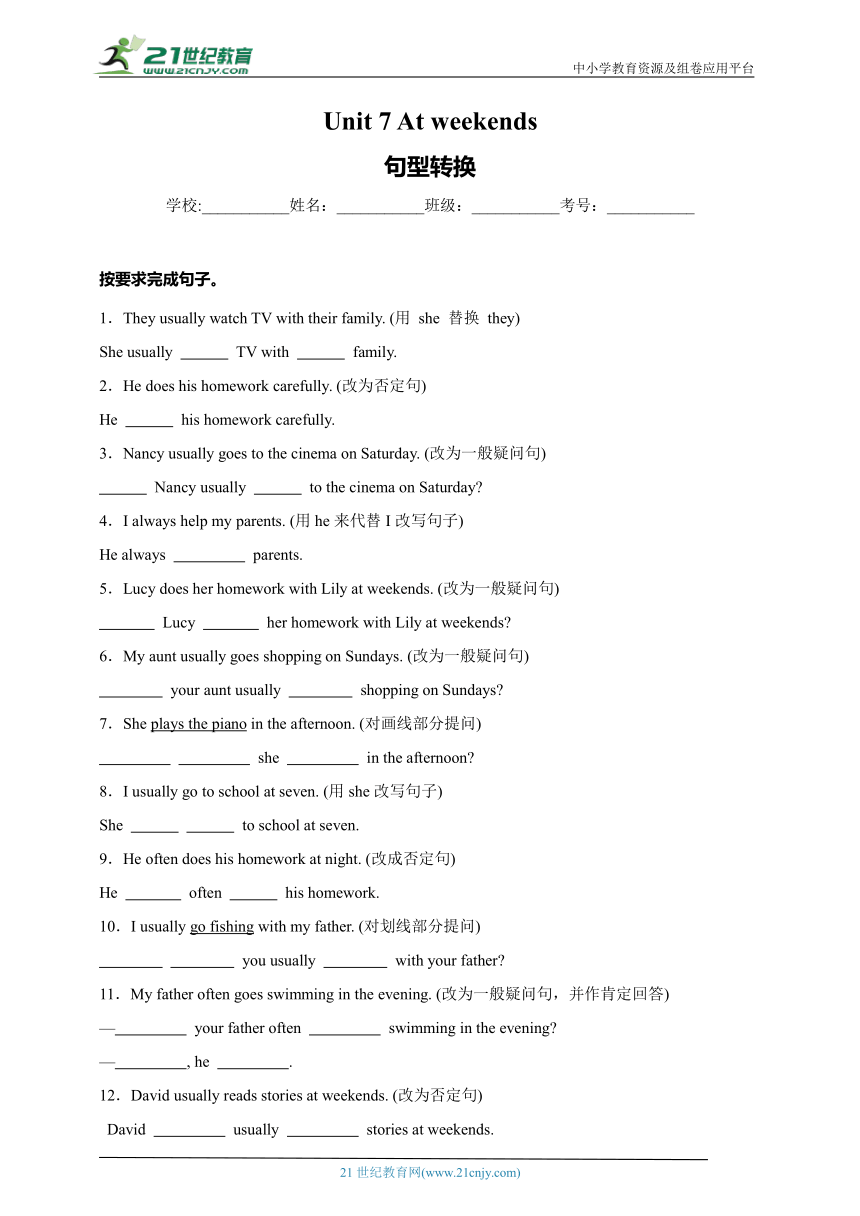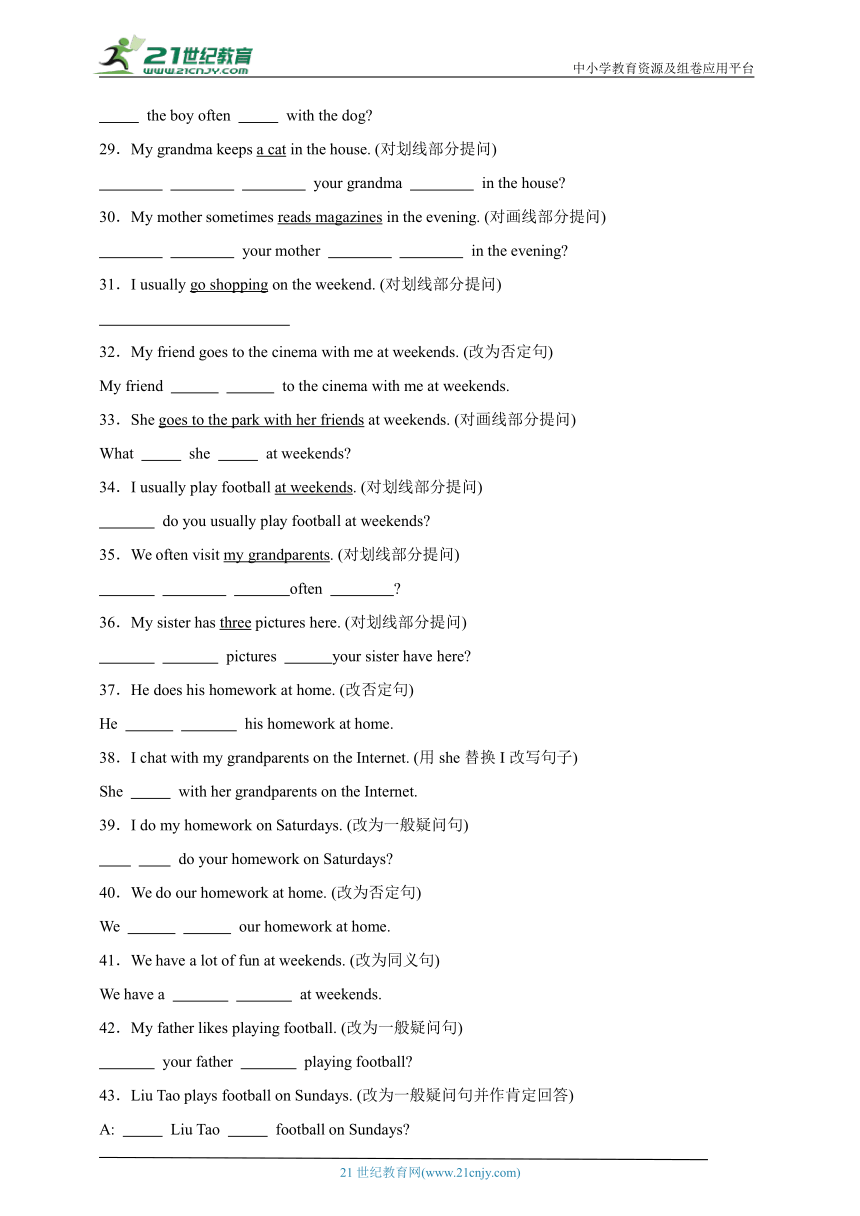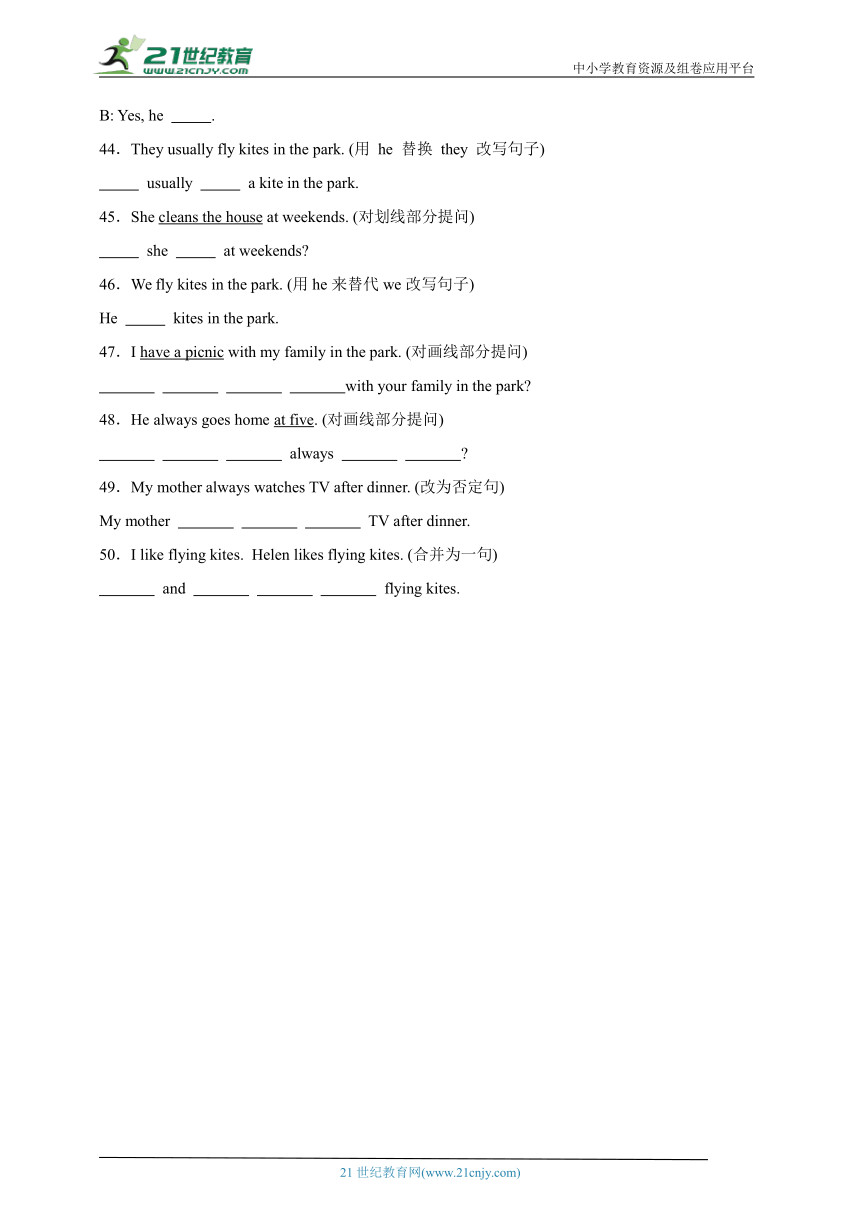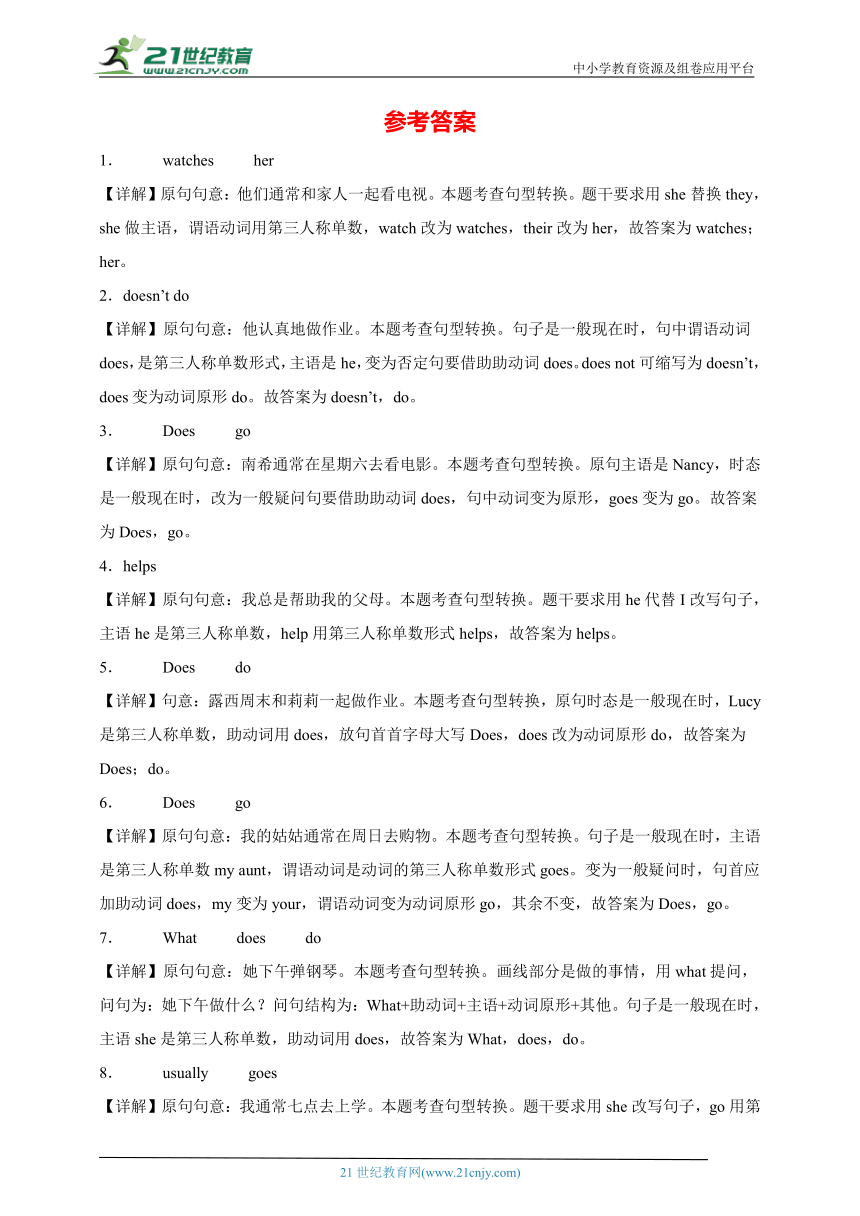Unit 7 At weekends句型转换(含解析)-2024-2025学年小学英语五年级上册单元专项练习(译林版三起)
文档属性
| 名称 | Unit 7 At weekends句型转换(含解析)-2024-2025学年小学英语五年级上册单元专项练习(译林版三起) |

|
|
| 格式 | docx | ||
| 文件大小 | 286.3KB | ||
| 资源类型 | 试卷 | ||
| 版本资源 | 牛津译林版 | ||
| 科目 | 英语 | ||
| 更新时间 | 2024-11-29 00:00:00 | ||
图片预览





文档简介
中小学教育资源及组卷应用平台
Unit 7 At weekends
句型转换
学校:___________姓名:___________班级:___________考号:___________
按要求完成句子。
1.They usually watch TV with their family. (用 she 替换 they)
She usually TV with family.
2.He does his homework carefully. (改为否定句)
He his homework carefully.
3.Nancy usually goes to the cinema on Saturday. (改为一般疑问句)
Nancy usually to the cinema on Saturday
4.I always help my parents. (用he来代替I改写句子)
He always parents.
5.Lucy does her homework with Lily at weekends. (改为一般疑问句)
Lucy her homework with Lily at weekends
6.My aunt usually goes shopping on Sundays. (改为一般疑问句)
your aunt usually shopping on Sundays
7.She plays the piano in the afternoon. (对画线部分提问)
she in the afternoon
8.I usually go to school at seven. (用she改写句子)
She to school at seven.
9.He often does his homework at night. (改成否定句)
He often his homework.
10.I usually go fishing with my father. (对划线部分提问)
you usually with your father
11.My father often goes swimming in the evening. (改为一般疑问句,并作肯定回答)
— your father often swimming in the evening
— , he .
12.David usually reads stories at weekends. (改为否定句)
David usually stories at weekends.
13.These boys play the piano every day. (对画线部分提问)
What these boys every day
14.She does the housework at weekends. (改为否定句)
She the housework at weekends.
15.My grandparents usually read books in the evening. (对画线部分提问)
your grandparents usually read books
16.He usually plays football at weekends. (对划线部分提问)
What he usually at weekends
17.I do my homework at five. (否定句)
I my homework at five.
18.She always chats on the Internet with her friends. (改为一般疑问句)
she always on the Internet with her friends
19.My uncle often goes to the park at weekends. (对画线部分提问)
your uncle often at weekends
20.Nancy often watches films at weekends. (对画线部分提问)
Nancy often do at weekends
21.They get up at seven every morning. (改为一般疑问句)
they up at seven every morning
22.Liu Tao does his homework after dinner. (改为否定句)
Liu Tao his homework after dinner.
23.Wang Bing often has lessons at weekends. (对画线部分提问)
does Wang Bing often at weekends
24.He goes to the park at weekends. (改为否定句)
He to the park at weekends.
25.Wang Bing does his homework before dinner. (改为否定句)
Wang Bing his homework before dinner.
26.Peter often flies kites in the park. (改为一般疑问句)
Peter often kites in the park
27.I usually have picnics with my friends in autumn. (对划线部分提问)
do usually do in autumn
28.The boy often plays with the dog. (改为一般疑问句)
the boy often with the dog
29.My grandma keeps a cat in the house. (对划线部分提问)
your grandma in the house
30.My mother sometimes reads magazines in the evening. (对画线部分提问)
your mother in the evening
31.I usually go shopping on the weekend. (对划线部分提问)
32.My friend goes to the cinema with me at weekends. (改为否定句)
My friend to the cinema with me at weekends.
33.She goes to the park with her friends at weekends. (对画线部分提问)
What she at weekends
34.I usually play football at weekends. (对划线部分提问)
do you usually play football at weekends
35.We often visit my grandparents. (对划线部分提问)
often
36.My sister has three pictures here. (对划线部分提问)
pictures your sister have here
37.He does his homework at home. (改否定句)
He his homework at home.
38.I chat with my grandparents on the Internet. (用she替换I改写句子)
She with her grandparents on the Internet.
39.I do my homework on Saturdays. (改为一般疑问句)
do your homework on Saturdays
40.We do our homework at home. (改为否定句)
We our homework at home.
41.We have a lot of fun at weekends. (改为同义句)
We have a at weekends.
42.My father likes playing football. (改为一般疑问句)
your father playing football
43.Liu Tao plays football on Sundays. (改为一般疑问句并作肯定回答)
A: Liu Tao football on Sundays
B: Yes, he .
44.They usually fly kites in the park. (用 he 替换 they 改写句子)
usually a kite in the park.
45.She cleans the house at weekends. (对划线部分提问)
she at weekends
46.We fly kites in the park. (用he来替代we改写句子)
He kites in the park.
47.I have a picnic with my family in the park. (对画线部分提问)
with your family in the park
48.He always goes home at five. (对画线部分提问)
always
49.My mother always watches TV after dinner. (改为否定句)
My mother TV after dinner.
50.I like flying kites. Helen likes flying kites. (合并为一句)
and flying kites.
参考答案
1. watches her
【详解】原句句意:他们通常和家人一起看电视。本题考查句型转换。题干要求用she替换they,she做主语,谓语动词用第三人称单数,watch改为watches,their改为her,故答案为watches;her。
2.doesn’t do
【详解】原句句意:他认真地做作业。本题考查句型转换。句子是一般现在时,句中谓语动词does,是第三人称单数形式,主语是he,变为否定句要借助助动词does。does not可缩写为doesn’t,does变为动词原形do。故答案为doesn’t,do。
3. Does go
【详解】原句句意:南希通常在星期六去看电影。本题考查句型转换。原句主语是Nancy,时态是一般现在时,改为一般疑问句要借助助动词does,句中动词变为原形,goes变为go。故答案为Does,go。
4.helps
【详解】原句句意:我总是帮助我的父母。本题考查句型转换。题干要求用he代替I改写句子,主语he是第三人称单数,help用第三人称单数形式helps,故答案为helps。
5. Does do
【详解】句意:露西周末和莉莉一起做作业。本题考查句型转换,原句时态是一般现在时,Lucy是第三人称单数,助动词用does,放句首首字母大写Does,does改为动词原形do,故答案为Does;do。
6. Does go
【详解】原句句意:我的姑姑通常在周日去购物。本题考查句型转换。句子是一般现在时,主语是第三人称单数my aunt,谓语动词是动词的第三人称单数形式goes。变为一般疑问时,句首应加助动词does,my变为your,谓语动词变为动词原形go,其余不变,故答案为Does,go。
7. What does do
【详解】原句句意:她下午弹钢琴。本题考查句型转换。画线部分是做的事情,用what提问,问句为:她下午做什么?问句结构为:What+助动词+主语+动词原形+其他。句子是一般现在时,主语she是第三人称单数,助动词用does,故答案为What,does,do。
8. usually goes
【详解】原句句意:我通常七点去上学。本题考查句型转换。题干要求用she改写句子,go用第三人称单数形式goes,故答案为usually,goes。
9. doesn’t do
【详解】原句句意:他经常在晚上做作业。本题考查句型转换。谓语动词does是第三人称单数,改为否定句,助动词用doesn’t,does变原形do,故答案为doesn’t,do。
10. What do do
【详解】原句句意:我通常和我爸爸一起去钓鱼。本题考查句型转换。划线部分是做的事情,用what提问,问句为:你通常和你爸爸一起做什么?问句结构为:What+助动词+主语+usually+动词原形+其他?主语是you,助动词用do,做do,故答案为What,do,do。
11. Does go Yes does
【详解】原句句意:我爸爸晚上去游泳。本题考查句型转换。原句谓语动词goes是第三人称单数,改为一般疑问句,助动词用does,goes变原形go,does引导的一般疑问句,肯定回答是Yes, 主语+does. 故答案为Does,go,Yes,does。
12. doesn’t read
【详解】原句句意:大卫通常在周末读故事。本题考查句型转换。原句谓语动词reads是第三人称单数,改为否定句,助动词用doesn’t,reads变原形read,故答案为doesn’t,read。
13. do do
【详解】原句句意:这些男孩子每天弹钢琴。本题考查句型转换。由画线部分可知要提问男孩们每天做什么,用what提问,句意是:这些男孩们每天做什么?句子是一般现在时。做do,主语是these boys,助动词用do。故答案为do;do。
14. doesn’t do
【详解】句意:她周末做家务。本题考查句型转换,根据句意可知该句是陈述句,时态为一般现在时,does是实义动词,主语She是第三人称单数,变为否定句,借助助动词doesn’t,实义动词does恢复原形do,故答案为doesn’t;do。
15. When do
【详解】原句句意:我的祖父母通常在晚上看书。本题考查句型转换。画线部分是时间,用when提问,句子是一般现在时,主语your grandparents是第三人称复数,助动词用do,故答案为When,do。
16. does do
【详解】句意:他通常在周末踢足球。本题考查句型转换。划线部分是做的事,用What提问,问句结构为:What+助动词+主语+动词原形+其他?句子是一般现在时,主语是he第三人称单数,助动词用does,做do。故答案为does,do。
17. don’t do
【详解】原句句意:我五点做作业。本题考查句型转换。原句是一般现在时,主语是I,改为否定句,助动词用don’t,后跟动词原形。故答案为don’t,do。
18. Does chat
【详解】句意:她总是在网上和她的朋友们聊天。本题考查句型转换。时态是一般现在时态,本题是含有实意动词的句子,主语是she,一般疑问句借助助动词does,动词的第三人称单数chats还原到动词原形chat,故答案为Does;chat。
19. What does do
【详解】原句句意:我叔叔周末经常去公园。划线部分是动作,用what提问,询问别人做什么用What do/does sb. do+其他 根据原句谓语动词goes,可知句子是一般现在时,主语your uncle是第三人称单数,助动词用does,故答案为What;does;do。
20. What does
【详解】原句句意:南茜经常在周末看电影。本题考查句型转换。画线部分是经常做的事情,用what提问,问句为:南茜周末经常做什么?句子是一般现在时,主语Nancy是第三人称单数,助动词用does,故答案为What,does。
21. Do get
【详解】原句句意:他们每天早上七点起床。本题考查句型转换。原句主语they是第三人称复数,时态是一般现在时,改为一般疑问句,助动词用do,故答案为Do,get。
22. doesn’t do
【详解】原句句意:刘涛晚饭后做作业。本题考查句型转换。原句谓语动词does是第三人称单数,改为否定句,助动词用doesn’t,does变原形do,故答案为doesn’t,do。
23. What do
【详解】原句句意:王兵经常在周末上课。本题考查句型转换。画线部分是做的事情,用what提问,问句为:王兵经常在周末做什么?做do,前面有助动词does,do用原形,故答案为What,do。
24. doesn’t go
【详解】原句句意:他在周末去公园。本题考查句型转换。该句时态为一般现在时,主语he为第三人称单数形式,变否定句时需借用助动词doesn’t,goes变为原形go,故答案为doesn’t;go。
25.doesn’t do
【详解】原句句意:王兵晚饭前做家庭作业。本题考查句型转换,改为否定句,动词does是第三人称单数形式,在主语后面加助动词doesn’t,does变为动词原形do,故答案为doesn’t do。
26. Does fly
【详解】本题考查句型转换。原句句意:彼得经常在公园里放风筝。改为一般疑问句,这是一般现在时的句子,主语是第三人称单数,借助于助动词does,Does+主语+动词原形+其他,flies的动词原形是fly,故答案为Does;fly。
27. What you
【详解】句意:在秋天,我通常和我的朋友们去野餐。本题考查句型转换。对划线部分提问用疑问词是What,句子时态是一般现在时,变为特殊疑问句借助于助动词do,主语I要变成you,故答案为What;you。
28. Does play
【详解】句意:这个男孩经常和狗一起玩。本题考查句型转换。题目要求改为一般疑问句,含有实意动词的句子变成一般疑问句需要借助助动词,时态是一般现在时态,主语the boy是第三人称单数,助动词是does,放在句首,首字母要大写,动词的第三人称单数plays还原到动词原形play,故答案为Does;play。
29. What animal does keep
【详解】句意:我奶奶在家里养了一只猫。本题考查特殊疑问句的问句,根据句意可知,该句时态为一般现在时,划线部分是动物,用What animal提问,keep是实义动词,主语grandma是第三人称单数,疑问句借助助动词does,实义动词用原形,故答案为What;animal;does;keep。
30. What does sometimes do
【详解】句意:我妈妈有时晚上读杂志。本题考查句型转换,划线部分是reads magazines,用What提问,问句结构为:What+助动词+主语+动词原形+其它? 主语your mother是第三人称单数,助动词用does,做do。故答案为What;does;sometimes;do。
31.What do you usually do on the weekend
【详解】原句句意:我周末通常去购物。本题考查句型转换,划线部分是做的事情,用what提问,问句为:你周末通常做什么?问句结构为:What+助动词+主语+usually+动词原形+其他?主语是you你,助动词用do,故答案为What do you usually do on the weekend
32. Doesn’t go
【详解】原句句意:我的朋友和我在周末去电影院。本题考查句型转换,goes是实义动词的第三人称单数,改为否定句需加助动词doesn’t,goes变回原形。故答案为doesn’t;go。
33. does do
【详解】原句句意:她在周末和朋友们一起去公园。本题考查特殊疑问句,画线部分是goes to the park with her friends,用what提问,goes是实义动词第三人称单数,助动词用does,即她在周末做什么?What does she do at weekends 故答案为does;do。
34.When
【详解】原句句意:我通常在周末踢足球。本题考查特殊疑问句,画线部分是at weekends,用when提问,后跟一般疑问句,故答案为When。
35. Who do you visit
【详解】句意:我们经常看望我的祖父母。本题考查特殊疑问句,划线部分是my grandparents,用who提问,问句结构为:Who+助动词+主语+动词原形+其他?将we改为you,句子是一般现在时,助动词用do,后跟动词原形,故答案为Who;do;you;visit。
36. How many does
【详解】原句句意:我姐姐这里有三张照片。本题考查特殊疑问句,划线部分是three,用how many提问,问句结构为:How many +可数名词复数 +助动词+主语+动词原形+其他?主语your sister是第三人称单数,句子是一般现在时,助动词用does,has变原形have,故答案为How;many;does。
37. doesn’t do
【详解】句意:他在家写家庭作业。本题考查句型转换,does实义动词,He是单数第三人称,改为否定句需加助动词doesn’t,does变回原形do。故答案为doesn’t;do。
38.chats
【详解】原句句意:我在网上和我的爷爷奶奶聊天。本题考查句型转换,该句是一般现在时,用she替换I改写句子,即将主语改为单数第三人称,谓语动词chat变为第三人称单数形式chats。故答案为chats。
39. Do you
【详解】原句句意:我星期六做作业。原句是一般现在时,主语I变you,助动词用do,故答案为Do,you。
40. don’t do
【详解】原句句意:我们在家做作业。原句是一般现在时,主语we是第一人称复数,改为否定句借助助动词don't,后跟动词原形,故答案为don't,do。
41. good time
【详解】句意:我们在周末玩得很开心。题干要求改为同义句, have a lot of fun=have a good time,故答案为good;time。
【点睛】
42. Does like
【详解】原句句意:我的爸爸喜欢踢足球。句中likes为实义动词,一般疑问句用助动词引导。句子为一般现在时态,主语My father是第三人称单数,助动词用does。句子结构为:Does+主语+动词原形+其他?likes的动词原形为like。故答案为Does;like。
【点睛】
43. Does play does
【详解】原句句意:刘涛在星期日踢足球。plays是实义动词单数第三人称,改为一般疑问句需加助动词Does,将plays变回原形,肯定回答为Yes, he does. 故答案为Does;play;does。
【点睛】
44. He flies
【详解】原句句意:他们通常在公园里放风筝。该句为一般现在时,用he替换they改写句子,动词fly要用第三人称单数形式flies,故答案为He;flies。
45. What does do
【详解】原句句意:她周末打扫房间。该句为一般现在时,划线部分表示做的事情,要用what(什么)来提问,后加一般疑问句,该句主语是she,助动词用does,动词原形用do,故答案为What does;do。
【点睛】
46.flies
【详解】句意:我们在公园放风筝。句子是一般现在时,用he来替代we改写句子,主语he是第三人称单数,谓语动词用动词第三人称单数形式,fly kites放风筝,fly的第三人称单数为flies,故答案为flies。
【点睛】
47. What do you do
【详解】原句句意:我和家人在公园里野餐。画线部分是动作用what提问,且用do代替,根据后面your,可知I也要改为you,句子含实义动词,问句借助助动词do,故答案为What;do;you;do。
【点睛】
48. When does he go home
【详解】原句句意:他总是在五点回家。画线部分是时间,用when提问,句子含实义动词goes,问句借助助动词does,goes还原为go,其他照抄,故答案为When;do;eshe;go;home。
【点睛】
49. doesn’t always watch
【详解】原句句意:我妈妈总是在晚饭后看电视。该句含实义动词watches,改为否定句,需要借助doesn't,watches还原为watch,故答案为doesn’t;always;watch。
【点睛】
50. Helen I both like
【详解】句意:我喜欢放风筝。海伦也喜欢放风筝。根据题意合并为一句应说海伦和我都喜欢放风筝,句子主语为Helen and I,动词应用原形like,两者都应用both,故答案为Helen;and;I;both;like。
21世纪教育网 www.21cnjy.com 精品试卷·第 2 页 (共 2 页)
21世纪教育网(www.21cnjy.com)
Unit 7 At weekends
句型转换
学校:___________姓名:___________班级:___________考号:___________
按要求完成句子。
1.They usually watch TV with their family. (用 she 替换 they)
She usually TV with family.
2.He does his homework carefully. (改为否定句)
He his homework carefully.
3.Nancy usually goes to the cinema on Saturday. (改为一般疑问句)
Nancy usually to the cinema on Saturday
4.I always help my parents. (用he来代替I改写句子)
He always parents.
5.Lucy does her homework with Lily at weekends. (改为一般疑问句)
Lucy her homework with Lily at weekends
6.My aunt usually goes shopping on Sundays. (改为一般疑问句)
your aunt usually shopping on Sundays
7.She plays the piano in the afternoon. (对画线部分提问)
she in the afternoon
8.I usually go to school at seven. (用she改写句子)
She to school at seven.
9.He often does his homework at night. (改成否定句)
He often his homework.
10.I usually go fishing with my father. (对划线部分提问)
you usually with your father
11.My father often goes swimming in the evening. (改为一般疑问句,并作肯定回答)
— your father often swimming in the evening
— , he .
12.David usually reads stories at weekends. (改为否定句)
David usually stories at weekends.
13.These boys play the piano every day. (对画线部分提问)
What these boys every day
14.She does the housework at weekends. (改为否定句)
She the housework at weekends.
15.My grandparents usually read books in the evening. (对画线部分提问)
your grandparents usually read books
16.He usually plays football at weekends. (对划线部分提问)
What he usually at weekends
17.I do my homework at five. (否定句)
I my homework at five.
18.She always chats on the Internet with her friends. (改为一般疑问句)
she always on the Internet with her friends
19.My uncle often goes to the park at weekends. (对画线部分提问)
your uncle often at weekends
20.Nancy often watches films at weekends. (对画线部分提问)
Nancy often do at weekends
21.They get up at seven every morning. (改为一般疑问句)
they up at seven every morning
22.Liu Tao does his homework after dinner. (改为否定句)
Liu Tao his homework after dinner.
23.Wang Bing often has lessons at weekends. (对画线部分提问)
does Wang Bing often at weekends
24.He goes to the park at weekends. (改为否定句)
He to the park at weekends.
25.Wang Bing does his homework before dinner. (改为否定句)
Wang Bing his homework before dinner.
26.Peter often flies kites in the park. (改为一般疑问句)
Peter often kites in the park
27.I usually have picnics with my friends in autumn. (对划线部分提问)
do usually do in autumn
28.The boy often plays with the dog. (改为一般疑问句)
the boy often with the dog
29.My grandma keeps a cat in the house. (对划线部分提问)
your grandma in the house
30.My mother sometimes reads magazines in the evening. (对画线部分提问)
your mother in the evening
31.I usually go shopping on the weekend. (对划线部分提问)
32.My friend goes to the cinema with me at weekends. (改为否定句)
My friend to the cinema with me at weekends.
33.She goes to the park with her friends at weekends. (对画线部分提问)
What she at weekends
34.I usually play football at weekends. (对划线部分提问)
do you usually play football at weekends
35.We often visit my grandparents. (对划线部分提问)
often
36.My sister has three pictures here. (对划线部分提问)
pictures your sister have here
37.He does his homework at home. (改否定句)
He his homework at home.
38.I chat with my grandparents on the Internet. (用she替换I改写句子)
She with her grandparents on the Internet.
39.I do my homework on Saturdays. (改为一般疑问句)
do your homework on Saturdays
40.We do our homework at home. (改为否定句)
We our homework at home.
41.We have a lot of fun at weekends. (改为同义句)
We have a at weekends.
42.My father likes playing football. (改为一般疑问句)
your father playing football
43.Liu Tao plays football on Sundays. (改为一般疑问句并作肯定回答)
A: Liu Tao football on Sundays
B: Yes, he .
44.They usually fly kites in the park. (用 he 替换 they 改写句子)
usually a kite in the park.
45.She cleans the house at weekends. (对划线部分提问)
she at weekends
46.We fly kites in the park. (用he来替代we改写句子)
He kites in the park.
47.I have a picnic with my family in the park. (对画线部分提问)
with your family in the park
48.He always goes home at five. (对画线部分提问)
always
49.My mother always watches TV after dinner. (改为否定句)
My mother TV after dinner.
50.I like flying kites. Helen likes flying kites. (合并为一句)
and flying kites.
参考答案
1. watches her
【详解】原句句意:他们通常和家人一起看电视。本题考查句型转换。题干要求用she替换they,she做主语,谓语动词用第三人称单数,watch改为watches,their改为her,故答案为watches;her。
2.doesn’t do
【详解】原句句意:他认真地做作业。本题考查句型转换。句子是一般现在时,句中谓语动词does,是第三人称单数形式,主语是he,变为否定句要借助助动词does。does not可缩写为doesn’t,does变为动词原形do。故答案为doesn’t,do。
3. Does go
【详解】原句句意:南希通常在星期六去看电影。本题考查句型转换。原句主语是Nancy,时态是一般现在时,改为一般疑问句要借助助动词does,句中动词变为原形,goes变为go。故答案为Does,go。
4.helps
【详解】原句句意:我总是帮助我的父母。本题考查句型转换。题干要求用he代替I改写句子,主语he是第三人称单数,help用第三人称单数形式helps,故答案为helps。
5. Does do
【详解】句意:露西周末和莉莉一起做作业。本题考查句型转换,原句时态是一般现在时,Lucy是第三人称单数,助动词用does,放句首首字母大写Does,does改为动词原形do,故答案为Does;do。
6. Does go
【详解】原句句意:我的姑姑通常在周日去购物。本题考查句型转换。句子是一般现在时,主语是第三人称单数my aunt,谓语动词是动词的第三人称单数形式goes。变为一般疑问时,句首应加助动词does,my变为your,谓语动词变为动词原形go,其余不变,故答案为Does,go。
7. What does do
【详解】原句句意:她下午弹钢琴。本题考查句型转换。画线部分是做的事情,用what提问,问句为:她下午做什么?问句结构为:What+助动词+主语+动词原形+其他。句子是一般现在时,主语she是第三人称单数,助动词用does,故答案为What,does,do。
8. usually goes
【详解】原句句意:我通常七点去上学。本题考查句型转换。题干要求用she改写句子,go用第三人称单数形式goes,故答案为usually,goes。
9. doesn’t do
【详解】原句句意:他经常在晚上做作业。本题考查句型转换。谓语动词does是第三人称单数,改为否定句,助动词用doesn’t,does变原形do,故答案为doesn’t,do。
10. What do do
【详解】原句句意:我通常和我爸爸一起去钓鱼。本题考查句型转换。划线部分是做的事情,用what提问,问句为:你通常和你爸爸一起做什么?问句结构为:What+助动词+主语+usually+动词原形+其他?主语是you,助动词用do,做do,故答案为What,do,do。
11. Does go Yes does
【详解】原句句意:我爸爸晚上去游泳。本题考查句型转换。原句谓语动词goes是第三人称单数,改为一般疑问句,助动词用does,goes变原形go,does引导的一般疑问句,肯定回答是Yes, 主语+does. 故答案为Does,go,Yes,does。
12. doesn’t read
【详解】原句句意:大卫通常在周末读故事。本题考查句型转换。原句谓语动词reads是第三人称单数,改为否定句,助动词用doesn’t,reads变原形read,故答案为doesn’t,read。
13. do do
【详解】原句句意:这些男孩子每天弹钢琴。本题考查句型转换。由画线部分可知要提问男孩们每天做什么,用what提问,句意是:这些男孩们每天做什么?句子是一般现在时。做do,主语是these boys,助动词用do。故答案为do;do。
14. doesn’t do
【详解】句意:她周末做家务。本题考查句型转换,根据句意可知该句是陈述句,时态为一般现在时,does是实义动词,主语She是第三人称单数,变为否定句,借助助动词doesn’t,实义动词does恢复原形do,故答案为doesn’t;do。
15. When do
【详解】原句句意:我的祖父母通常在晚上看书。本题考查句型转换。画线部分是时间,用when提问,句子是一般现在时,主语your grandparents是第三人称复数,助动词用do,故答案为When,do。
16. does do
【详解】句意:他通常在周末踢足球。本题考查句型转换。划线部分是做的事,用What提问,问句结构为:What+助动词+主语+动词原形+其他?句子是一般现在时,主语是he第三人称单数,助动词用does,做do。故答案为does,do。
17. don’t do
【详解】原句句意:我五点做作业。本题考查句型转换。原句是一般现在时,主语是I,改为否定句,助动词用don’t,后跟动词原形。故答案为don’t,do。
18. Does chat
【详解】句意:她总是在网上和她的朋友们聊天。本题考查句型转换。时态是一般现在时态,本题是含有实意动词的句子,主语是she,一般疑问句借助助动词does,动词的第三人称单数chats还原到动词原形chat,故答案为Does;chat。
19. What does do
【详解】原句句意:我叔叔周末经常去公园。划线部分是动作,用what提问,询问别人做什么用What do/does sb. do+其他 根据原句谓语动词goes,可知句子是一般现在时,主语your uncle是第三人称单数,助动词用does,故答案为What;does;do。
20. What does
【详解】原句句意:南茜经常在周末看电影。本题考查句型转换。画线部分是经常做的事情,用what提问,问句为:南茜周末经常做什么?句子是一般现在时,主语Nancy是第三人称单数,助动词用does,故答案为What,does。
21. Do get
【详解】原句句意:他们每天早上七点起床。本题考查句型转换。原句主语they是第三人称复数,时态是一般现在时,改为一般疑问句,助动词用do,故答案为Do,get。
22. doesn’t do
【详解】原句句意:刘涛晚饭后做作业。本题考查句型转换。原句谓语动词does是第三人称单数,改为否定句,助动词用doesn’t,does变原形do,故答案为doesn’t,do。
23. What do
【详解】原句句意:王兵经常在周末上课。本题考查句型转换。画线部分是做的事情,用what提问,问句为:王兵经常在周末做什么?做do,前面有助动词does,do用原形,故答案为What,do。
24. doesn’t go
【详解】原句句意:他在周末去公园。本题考查句型转换。该句时态为一般现在时,主语he为第三人称单数形式,变否定句时需借用助动词doesn’t,goes变为原形go,故答案为doesn’t;go。
25.doesn’t do
【详解】原句句意:王兵晚饭前做家庭作业。本题考查句型转换,改为否定句,动词does是第三人称单数形式,在主语后面加助动词doesn’t,does变为动词原形do,故答案为doesn’t do。
26. Does fly
【详解】本题考查句型转换。原句句意:彼得经常在公园里放风筝。改为一般疑问句,这是一般现在时的句子,主语是第三人称单数,借助于助动词does,Does+主语+动词原形+其他,flies的动词原形是fly,故答案为Does;fly。
27. What you
【详解】句意:在秋天,我通常和我的朋友们去野餐。本题考查句型转换。对划线部分提问用疑问词是What,句子时态是一般现在时,变为特殊疑问句借助于助动词do,主语I要变成you,故答案为What;you。
28. Does play
【详解】句意:这个男孩经常和狗一起玩。本题考查句型转换。题目要求改为一般疑问句,含有实意动词的句子变成一般疑问句需要借助助动词,时态是一般现在时态,主语the boy是第三人称单数,助动词是does,放在句首,首字母要大写,动词的第三人称单数plays还原到动词原形play,故答案为Does;play。
29. What animal does keep
【详解】句意:我奶奶在家里养了一只猫。本题考查特殊疑问句的问句,根据句意可知,该句时态为一般现在时,划线部分是动物,用What animal提问,keep是实义动词,主语grandma是第三人称单数,疑问句借助助动词does,实义动词用原形,故答案为What;animal;does;keep。
30. What does sometimes do
【详解】句意:我妈妈有时晚上读杂志。本题考查句型转换,划线部分是reads magazines,用What提问,问句结构为:What+助动词+主语+动词原形+其它? 主语your mother是第三人称单数,助动词用does,做do。故答案为What;does;sometimes;do。
31.What do you usually do on the weekend
【详解】原句句意:我周末通常去购物。本题考查句型转换,划线部分是做的事情,用what提问,问句为:你周末通常做什么?问句结构为:What+助动词+主语+usually+动词原形+其他?主语是you你,助动词用do,故答案为What do you usually do on the weekend
32. Doesn’t go
【详解】原句句意:我的朋友和我在周末去电影院。本题考查句型转换,goes是实义动词的第三人称单数,改为否定句需加助动词doesn’t,goes变回原形。故答案为doesn’t;go。
33. does do
【详解】原句句意:她在周末和朋友们一起去公园。本题考查特殊疑问句,画线部分是goes to the park with her friends,用what提问,goes是实义动词第三人称单数,助动词用does,即她在周末做什么?What does she do at weekends 故答案为does;do。
34.When
【详解】原句句意:我通常在周末踢足球。本题考查特殊疑问句,画线部分是at weekends,用when提问,后跟一般疑问句,故答案为When。
35. Who do you visit
【详解】句意:我们经常看望我的祖父母。本题考查特殊疑问句,划线部分是my grandparents,用who提问,问句结构为:Who+助动词+主语+动词原形+其他?将we改为you,句子是一般现在时,助动词用do,后跟动词原形,故答案为Who;do;you;visit。
36. How many does
【详解】原句句意:我姐姐这里有三张照片。本题考查特殊疑问句,划线部分是three,用how many提问,问句结构为:How many +可数名词复数 +助动词+主语+动词原形+其他?主语your sister是第三人称单数,句子是一般现在时,助动词用does,has变原形have,故答案为How;many;does。
37. doesn’t do
【详解】句意:他在家写家庭作业。本题考查句型转换,does实义动词,He是单数第三人称,改为否定句需加助动词doesn’t,does变回原形do。故答案为doesn’t;do。
38.chats
【详解】原句句意:我在网上和我的爷爷奶奶聊天。本题考查句型转换,该句是一般现在时,用she替换I改写句子,即将主语改为单数第三人称,谓语动词chat变为第三人称单数形式chats。故答案为chats。
39. Do you
【详解】原句句意:我星期六做作业。原句是一般现在时,主语I变you,助动词用do,故答案为Do,you。
40. don’t do
【详解】原句句意:我们在家做作业。原句是一般现在时,主语we是第一人称复数,改为否定句借助助动词don't,后跟动词原形,故答案为don't,do。
41. good time
【详解】句意:我们在周末玩得很开心。题干要求改为同义句, have a lot of fun=have a good time,故答案为good;time。
【点睛】
42. Does like
【详解】原句句意:我的爸爸喜欢踢足球。句中likes为实义动词,一般疑问句用助动词引导。句子为一般现在时态,主语My father是第三人称单数,助动词用does。句子结构为:Does+主语+动词原形+其他?likes的动词原形为like。故答案为Does;like。
【点睛】
43. Does play does
【详解】原句句意:刘涛在星期日踢足球。plays是实义动词单数第三人称,改为一般疑问句需加助动词Does,将plays变回原形,肯定回答为Yes, he does. 故答案为Does;play;does。
【点睛】
44. He flies
【详解】原句句意:他们通常在公园里放风筝。该句为一般现在时,用he替换they改写句子,动词fly要用第三人称单数形式flies,故答案为He;flies。
45. What does do
【详解】原句句意:她周末打扫房间。该句为一般现在时,划线部分表示做的事情,要用what(什么)来提问,后加一般疑问句,该句主语是she,助动词用does,动词原形用do,故答案为What does;do。
【点睛】
46.flies
【详解】句意:我们在公园放风筝。句子是一般现在时,用he来替代we改写句子,主语he是第三人称单数,谓语动词用动词第三人称单数形式,fly kites放风筝,fly的第三人称单数为flies,故答案为flies。
【点睛】
47. What do you do
【详解】原句句意:我和家人在公园里野餐。画线部分是动作用what提问,且用do代替,根据后面your,可知I也要改为you,句子含实义动词,问句借助助动词do,故答案为What;do;you;do。
【点睛】
48. When does he go home
【详解】原句句意:他总是在五点回家。画线部分是时间,用when提问,句子含实义动词goes,问句借助助动词does,goes还原为go,其他照抄,故答案为When;do;eshe;go;home。
【点睛】
49. doesn’t always watch
【详解】原句句意:我妈妈总是在晚饭后看电视。该句含实义动词watches,改为否定句,需要借助doesn't,watches还原为watch,故答案为doesn’t;always;watch。
【点睛】
50. Helen I both like
【详解】句意:我喜欢放风筝。海伦也喜欢放风筝。根据题意合并为一句应说海伦和我都喜欢放风筝,句子主语为Helen and I,动词应用原形like,两者都应用both,故答案为Helen;and;I;both;like。
21世纪教育网 www.21cnjy.com 精品试卷·第 2 页 (共 2 页)
21世纪教育网(www.21cnjy.com)
